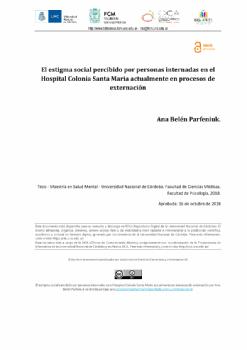| dc.contributor.advisor | Berra, Cecilia | |
| dc.contributor.author | Parfeniuk, Ana Belén | |
| dc.date.accessioned | 2020-03-05T21:23:50Z | |
| dc.date.issued | 2018-10-16 | |
| dc.identifier.uri | http://hdl.handle.net/11086/14992 | |
| dc.description | Tesis - Maestría en Salud Mental - Universidad Nacional de Córdoba. Facultad de Ciencias Médicas. Facultad de Psicología, 2018 | es |
| dc.description.abstract | En general, el estigma social es el resultado de múltiples procesos de etiquetamiento, estereotipación, segregación y discriminación, los que invariablemente ocurren en el contexto de un poder asimétrico. Las personas con padecimientos
mentales constituyen uno de los grupos más estigmatizados en nuestra sociedad y son objeto de prácticas discriminatorias.
En este trabajo de tesis se presenta y analiza información directa recogida entre sujetos estigmatizados socialmente por presentar un padecimiento mental. Más precisamente, el objetivo de esta tesis de Maestría es analizar el estigma
social percibido en personas internadas en el Hospital Colonia Santa María ubicado en el centro del Departamento Punilla en la Provincia de Córdoba- y que actualmente se encuentran en proceso de externación. Para llevar adelante el estudio se utilizó un enfoque cualitativo desde un paradigma emergente, partiendo de la caracterización general que los principales teóricos hacen de la “enfermedad mental” (sobre éste concepto se realizan aclaraciones a pie de página en la Introducción de esta tesis) en tanto estigma de quienes la padecen: cuestión a ser examinada en nuestro aquí y ahora social.
En cuanto a técnicas e instrumentos a ser utilizados, se administraron entrevistas semi-estructuradas. Como instrumento dentro de esta técnica se utilizó el cuestionario de preguntas. Dicho cuestionario fue organizado en función de las siguientes categorías: Datos Personales /Grupo Familiar, Nivel de instrucción/Actividad Laboral, Red Social/Participación, Historia del padecimiento/Internación, Experiencias de maltrato/Agresividad /Sufrimiento.
En la parte final del trabajo se elaboran las conclusiones a partir de testimonios seleccionados, los cuales son comentados y analizados con relación a la Percepción del Estigma: tema /problema de la tesis. Cabe aclarar que los resultados obtenidos fueron analizados tomando en cuenta las últimas cuatro categorías anteriormente mencionadas.
Respecto de las conclusiones, se adelanta la existencia de diversidad de casos y situaciones, las que conforman una compleja red que solo en parte da cuenta de lo que se esperaba encontrar. Finalmente se reflexiona sobre la responsabilidad de los trabajadores del campo de la salud mental, a quienes les toca la tarea de correr, tanto los velos que cubren al poder que estigmatiza a quienes no siguen las normas establecidas, cuanto el compromiso de ayudar a que la sociedad acepte a los otros diferentes, sin que esas diferencias constituyan dolorosos y vergonzantes estigmas (“Estigmas”). | es |
| dc.description.abstract | Stigma is the result of several processes of labeling, stereotyping, segregation and discrimination, which usually occur in the context of an asymmetric power. People with mental disorders are one of the most stigmatized groups in our society and are the product of discriminatory practices. In the following thesis work will collect direct information from those who are subject to the stigma of being socially perceived as subjects with mental disorders, will be the subject-research problem of this master's thesis. The objective of this Master's thesis is to analyze the social stigma perceived in people interned in the Hospital Colonia Santa Maria, located in the center of the Punilla Department in the Province of Córdoba, and that are currently in the process of externalization. To carry out the study, a qualitative approach was used and from an emerging paradigm, based on the general characterization that the main theorists make of the "mental illness" -this concept is clarified in the footnote of the Introduction- as a stigma of who suffer it to be examined in our social here and now.
Regarding techniques and instruments to be used, basically we worked with semistructured interviews. As an instrument within this technique, the questionnaire of questions was used. Given that they are directly related to the research undertaken, this questionnaire was organized according to the following categories: Personal Data / Family Group, Level of instruction / Work Activity, Social Network / Participation, History of the condition / Hospitalization, Abuse experiences / Aggression / Suffering to finally conclude with selected testimonies, commented and analyzed with respect to the last category, the Perception of the Stigma: theme - problem of the present thesis. The results obtained are analyzed taking into account the last four categories just mentioned. Conclusions: Regarding the self-perception and acceptance of thems selves, the following was found: that three interviewees do not accept each other and do not want each other as they are; five interviewees do accept and love each other; and two interviewees who do not have internal registration, for which they have not been able to respond.
In relation to family integration, five of ten interviewees feel integrated by the family system. When it was inquired about the perception of others towards them, it was found that two have no record of that, the interviewees feel discriminated against and stigmatized and two have a good perception of the others' view. Mental health workers are given the task of running, both the veils that cover the power that disguises their tactics of displacement of guilt and isolation of those who do not follow the rules, as well as the commitment to help society accept to the different ones without those differences constituting "Stigmas". | en |
| dc.language.iso | spa | es |
| dc.rights | Atribución 4.0 Internacional | * |
| dc.rights.uri | http://creativecommons.org/licenses/by/4.0/ | * |
| dc.source | Parfeniuk AB. El estigma social percibido por personas internadas en el Hospital Colonia Santa María actualmente en procesos de externación [Internet]. 2018 [citado el 5 de marzo de 2020]. Disponible en: https://rdu.unc.edu.ar/handle/11086/14992 | es |
| dc.subject | Research Subject Categories::MEDICINE | es |
| dc.subject | Salud mental | es |
| dc.subject | Estigma social | es |
| dc.title | El estigma social percibido por personas internadas en el Hospital Colonia Santa María actualmente en procesos de externación | es |
| dc.type | masterThesis | es |
| dc.description.embargo | 2020-10-16 | |
| dc.description.fil | Fil: Parfeniuk, Ana Belen. Universidad Nacional de Córdoba. Facultad de Psicología. Facultad de Ciencias Médicas; Argentina. | es |





